
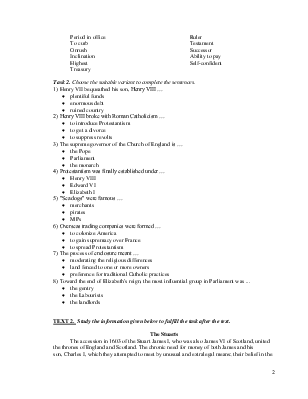
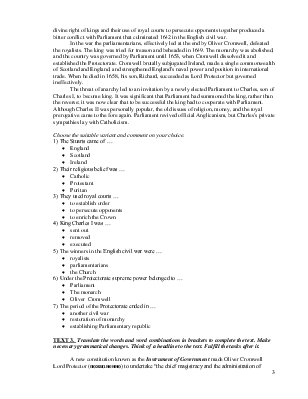
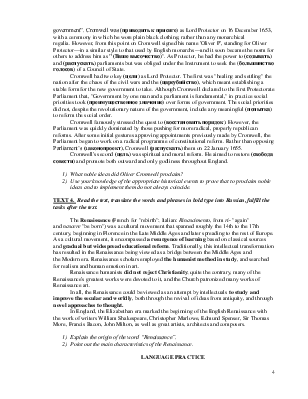
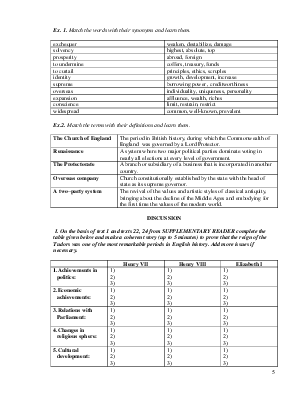
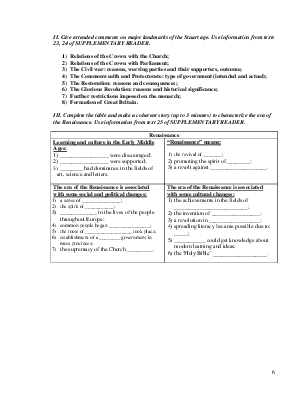
UNIT 4
GREAT BRITAIN IN THE 16-th and 17-th CENTURIES
LIST OF WORDS
exchequer
merchants
nobility
the clergy
the gentry
financial solvency
to maintain peace
to create economic prosperity
to undermine (the power)
to keep (parliament) under control
to curtail the power
sense of national identity
heir
reign
supreme governor
preference for (practices)
overseas (company)
expansion of trade
accession
to persecute opponents
to come to the fore
to be sworn in
regicide
to take precedence
to restore order
liberty of conscience
TEXT 1. Read the text and fulfill the tasks that follow it.
Tudor England
The reign of the Tudors (1485–1603) is one of the most fascinating periods in English history. Henry VII restored political order and the financial solvency of the crown, bequeathing his son, Henry VIII, a full exchequer.
In 1536, Henry VIII brought about the political union of England and Wales. During Henry’s reign commerce flourished and the New Learning of the Renaissance came to England. Several factors climaxed by the pope's refusal to grant Henry a divorce from Katharine of Aragón so that he could remarry and have a male heir—led the king to break with Roman Catholicism and establish the Church of England. The Church of England is the Christian church constitutionally established by the state with the head of state as its supreme governor. Henry maintained a strong preference for traditional Catholic practices and, during his reign, Protestant reformers were unable to make many changes to the practices of the Church of England. As part of the English Reformation (1529–39), Henry suppressed the orders of monks and friars and secularized their property. Although these actions aroused some popular opposition, Henry's judicious use of Parliament helped secure support for his policies and set important precedents for the future of Parliament.
England moved farther toward Protestantism under Edward VI. After a generally hated Roman Catholic revival under Mary I, the Roman tie was again cut under Elizabeth I, who attempted without complete success to moderate the religious differences among her people.
The Elizabethan age was one of great artistic and intellectual achievement, its most notable figure being William Shakespeare. National pride basked in the exploits of Sir Francis Drake, Sir John Hawkins, and the other "sea dogs." Overseas trading companies were formed and colonization attempts in the New World were made. Inflated prices, caused by an influx of precious metals from the New World, and the reservation of land by the process of enclosure for sheep pasture (stimulated by the expansion of the wool trade) caused great changes in the social and economic structure of England. The country gentry were enriched by the enclosures and by their purchase of former monastic lands, which were also used for grazing. Toward the end of Elizabeth's reign, the gentry became leaders in an increasingly assertive Parliament.
Task 1. Find in the text the words with the following meaning:
Period in office
To curb
Onrush
Inclination
Highest
Treasury
Ruler
Testament
Successor
Ability to pay
Self-confident
Task 2. Choose the suitable variant to complete the sentences.
1) Henry VII bequeathed his son, Henry VIII …
2) Henry VIII broke with Roman Catholicism …
3) The supreme governor of the Church of England is …
4) Protestantism was finally established under …
5) "Sea dogs" were famous …
6) Overseas trading companies were formed …
7) The process of enclosure meant …
8) Toward the end of Elizabeth's reign, the most influential group in Parliament was ...
TEXT 2. Study the information given below to fulfill the task after the text.
The Stuarts
The accession in 1603 of the Stuart James I, who was also James VI of Scotland, united the thrones of England and Scotland. The chronic need for money of both James and his son, Charles I, which they attempted to meet by unusual and extralegal means; their belief in the divine right of kings and their use of royal courts to persecute opponents together produced a bitter conflict with Parliament that culminated 1642 in the English civil war.
In the war the parliamentarians, effectively led at the end by Oliver Cromwell, defeated the royalists. The king was tried for treason and beheaded in 1649. The monarchy was abolished, and the country was governed by Parliament until 1653, when Cromwell dissolved it and established the Protectorate. Cromwell brutally subjugated Ireland, made a single commonwealth of Scotland and England, and strengthened England's naval power and position in international trade. When he died in 1658, his son, Richard, succeeded as Lord Protector but governed ineffectively.
The threat of anarchy led to an invitation by a newly elected Parliament to Charles, son of Charles I, to become king. It was significant that Parliament had summoned the king, rather than the reverse; it was now clear that to be successful the king had to cooperate with Parliament.
Although Charles II was personally popular, the old issues of religion, money, and the royal prerogative came to the fore again. Parliament revived official Anglicanism, but Charles's private sympathies lay with Catholicism.
Choose the suitable variant and comment on your choice.
1) The Stuarts came of …
2) Their religious belief was …
3) They used royal courts …
4) King Charles I was …
5) The winners in the English civil war were …
6) Under the Protectorate supreme power belonged to …
7) The period of the Protectorate ended in …
TEXT 3. Translate the words and word combinations in brackets to complete
Уважаемый посетитель!
Чтобы распечатать файл, скачайте его (в формате Word).
Ссылка на скачивание - внизу страницы.